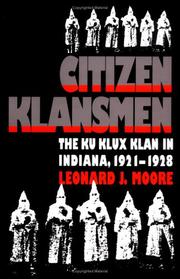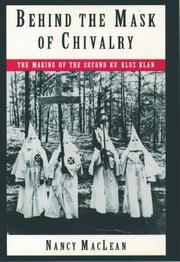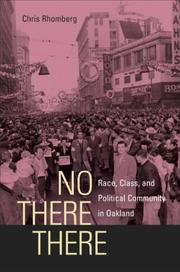| Listing 1 - 10 of 16 | << page >> |
Sort by
|

ISBN: 0807863491 9780807863497 0807819816 9780807819814 9798890868572 Year: 1991 Publisher: Chapel Hill University of North Carolina Press
Abstract | Keywords | Export | Availability | Bookmark
 Loading...
Loading...Choose an application
- Reference Manager
- EndNote
- RefWorks (Direct export to RefWorks)
Sociology & Social History --- Social Sciences --- Societies & Clubs --- Ku Klux Klan (1915- ) --- Ku Klux Klan (19th century) --- Knights of the Ku Klux Klan (1915- ) --- K.K.K. (Ku Klux Klan (1915- )) --- KKK (Ku Klux Klan (1915- )) --- K.K.K.K. (Knights of the Ku Klux Klan (1915- )) --- KKKK (Knights of the Ku Klux Klan (1915- )) --- National Knights of the Ku Klux Klan Association of America --- National Knights of the K.K.K. --- Invisible Empire --- History. --- Ku Klux Klan --- Indiana --- History
Book
ISBN: 0813161975 9780813161976 081315104X 9780813151045 0813183332 Year: 2015 Publisher: Lexington The University Press of Kentucky
Abstract | Keywords | Export | Availability | Bookmark
 Loading...
Loading...Choose an application
- Reference Manager
- EndNote
- RefWorks (Direct export to RefWorks)
This is a study of a disturbing phenomenon in American society -- the Ku Klux Klan -- and that eruption of nativism, racism and moral authoritarianism during the 1920's in the four states of the Southwest -- Texas, Louisiana, Oklahoma, and Arkansas -- in which the Klan became especially powerful. The hooded order is viewed here as a move by frustrated Americans, through anonymous acts of terror and violence, and later through politics), to halt a changing social order and restore familiar orthodox traditions of morality. Entering the Southwest during the post-World War I period of discontent
Ku Klux Klan (1915- ) --- Ku Klux Klan (19th century) --- Knights of the Ku Klux Klan (1915- ) --- K.K.K. (Ku Klux Klan (1915- )) --- KKK (Ku Klux Klan (1915- )) --- K.K.K.K. (Knights of the Ku Klux Klan (1915- )) --- KKKK (Knights of the Ku Klux Klan (1915- )) --- National Knights of the Ku Klux Klan Association of America --- National Knights of the K.K.K. --- Invisible Empire
Book
ISBN: 1613763794 9781613763797 9781625341884 9781625341891 1625341881 162534189X Year: 2015 Publisher: Amherst : Baltimore, Md. : University of Massachusetts Press, Project MUSE,
Abstract | Keywords | Export | Availability | Bookmark
 Loading...
Loading...Choose an application
- Reference Manager
- EndNote
- RefWorks (Direct export to RefWorks)
Borderlands --- French-Canadians --- Anti-Catholicism --- Border-lands --- Border regions --- Frontiers --- Boundaries --- Canadians, Francophone --- Canadians, French-speaking --- Francophone Canadians --- French-speaking Canadians --- Canadians --- Antipapism --- Prejudices --- History --- Ku Klux Klan (1915- ) --- Ku Klux Klan (19th century) --- Knights of the Ku Klux Klan (1915- ) --- K.K.K. (Ku Klux Klan (1915- )) --- KKK (Ku Klux Klan (1915- )) --- K.K.K.K. (Knights of the Ku Klux Klan (1915- )) --- KKKK (Knights of the Ku Klux Klan (1915- )) --- National Knights of the Ku Klux Klan Association of America --- National Knights of the K.K.K. --- Invisible Empire
Book
ISBN: 1628950706 1609171357 9781609171353 9781628960709 1628960701 9780870139956 0870139959 Year: 2011 Publisher: East Lansing Michigan State University Press
Abstract | Keywords | Export | Availability | Bookmark
 Loading...
Loading...Choose an application
- Reference Manager
- EndNote
- RefWorks (Direct export to RefWorks)
In 1920s Middle America, the Ku Klux Klan gained popularity not by appealing to the fanatical fringes of society, but by attracting the interest of average citizens. During this period, the Klan recruited members through the same unexceptional channels as any other organization or club, becoming for many a respectable public presence, a vehicle for civic activism, or the source of varied social interaction. Its diverse membership included men and women of all ages, occupations, and socio-economic standings. Although surviving membership records of this clandestine organization have proved incredibly rare, Everyday Klansfolk uses newly available documents to reconstruct the life and social context of a single grassroots unit in Newaygo County, Michigan. A fascinating glimpse behind the mask of America's most notorious secret order, this absorbing study sheds light on KKK activity and membership in Newaygo County, and in Michigan at large, during the brief and remarkable peak years of its mass popular appeal.
Social conflict --- Protestants --- Middle class --- Christians --- Class conflict --- Class struggle --- Conflict, Social --- Social tensions --- Interpersonal conflict --- Social psychology --- Sociology --- Bourgeoisie --- Commons (Social order) --- Middle classes --- Social classes --- History. --- Social conditions --- Ku Klux Klan (1915- ) --- Ku Klux Klan (19th century) --- Knights of the Ku Klux Klan (1915- ) --- K.K.K. (Ku Klux Klan (1915- )) --- KKK (Ku Klux Klan (1915- )) --- K.K.K.K. (Knights of the Ku Klux Klan (1915- )) --- KKKK (Knights of the Ku Klux Klan (1915- )) --- National Knights of the Ku Klux Klan Association of America --- National Knights of the K.K.K. --- Invisible Empire --- United States --- Conflits sociaux --- History --- Histoire --- Etats-Unis --- Conditions sociales
Book
ISBN: 0268104352 9780268104351 9780268104368 0268104360 9780268104344 0268104344 9780268104344 Year: 2018 Publisher: Notre Dame
Abstract | Keywords | Export | Availability | Bookmark
 Loading...
Loading...Choose an application
- Reference Manager
- EndNote
- RefWorks (Direct export to RefWorks)
Anti-Catholicism --- Antipapism --- Prejudices --- History --- University of Notre Dame --- Ku Klux Klan (1915- ) --- Ku Klux Klan (19th century) --- Knights of the Ku Klux Klan (1915- ) --- K.K.K. (Ku Klux Klan (1915- )) --- KKK (Ku Klux Klan (1915- )) --- K.K.K.K. (Knights of the Ku Klux Klan (1915- )) --- KKKK (Knights of the Ku Klux Klan (1915- )) --- National Knights of the Ku Klux Klan Association of America --- National Knights of the K.K.K. --- Invisible Empire --- Notre Dame, Ind. University --- South Bend (Ind.). University of Notre Dame --- South Bend (Ind.). Notre Dame University --- Notre Dame University --- Notre Dame (Ind.). University of Notre Dame --- University of Notre Dame du Lac --- Notr-Damskiĭ universitet --- History.
Book
ISBN: 0774824913 0774824905 0774824891 Year: 2013 Publisher: Vancouver : ©2013 UBC Press,
Abstract | Keywords | Export | Availability | Bookmark
 Loading...
Loading...Choose an application
- Reference Manager
- EndNote
- RefWorks (Direct export to RefWorks)
This provocative book provides a new interpretation of the Ku Klux Klan in 1920s Saskatchewan, arguing that it should not be portrayed merely as an irrational outburst of intolerance but as a slightly more extreme version of mainstream opinion that wanted to keep Canada British.
Racism --- History --- Ku Klux Klan (1915-) --- Saskatchewan --- Race relations --- Bias, Racial --- Race bias --- Race prejudice --- Racial bias --- Prejudices --- Anti-racism --- Critical race theory --- Knights of the Ku Klux Klan (1915- ) --- K.K.K. (Ku Klux Klan (1915- )) --- KKK (Ku Klux Klan (1915- )) --- K.K.K.K. (Knights of the Ku Klux Klan (1915- )) --- KKKK (Knights of the Ku Klux Klan (1915- )) --- National Knights of the Ku Klux Klan Association of America --- National Knights of the K.K.K. --- Invisible Empire --- Ku Klux Klan (19th century) --- Saskachevan --- Saskatchewan Government --- Government of Saskatchewan --- SK --- Sask. --- Social conditions

ISBN: 0199879400 0585327866 1602560625 1280451475 0198023650 9780585327860 9780195098365 0195098366 9781280451478 0195072340 9780195072341 0195098366 9786610451470 6610451478 9780203427255 0203427254 9780198023654 0197711677 9780199879403 9781602560628 Year: 2023 Publisher: New York ; Oxford University Press,
Abstract | Keywords | Export | Availability | Bookmark
 Loading...
Loading...Choose an application
- Reference Manager
- EndNote
- RefWorks (Direct export to RefWorks)
The is the story of the evolution of the Athens, Georgia, chapter of the Ku Klux Klan in the decade following World War I, when Klan influence peaked in America. It explores the interconnected social issues of race, class and sex, and how these forces combined to create such a brutal organization.
Athens (Ga.) - Race relations. --- Political Science. --- Social Science. --- Sociology & Social History --- Social Sciences --- Societies & Clubs --- #KVHA:Ku Klux Klan; Verenigde Staten --- #KVHA:Rassenstrijd; Verenigde Staten --- #KVHA:American Studies --- Political clubs --- Political societies --- Clubs --- Political parties --- Ku Klux Klan (1915- ) --- Knights of the Ku Klux Klan (1915- ) --- K.K.K. (Ku Klux Klan (1915- )) --- KKK (Ku Klux Klan (1915- )) --- K.K.K.K. (Knights of the Ku Klux Klan (1915- )) --- KKKK (Knights of the Ku Klux Klan (1915- )) --- National Knights of the Ku Klux Klan Association of America --- National Knights of the K.K.K. --- Invisible Empire --- Ku Klux Klan (19th century) --- Athens (Ga.) --- Athens-Clarke County (Ga.) --- Race relations. --- Social conditions. --- Ku Klux Klan --- Georgia --- Race relations --- Social conditions
Book
ISBN: 1283891204 161075509X 9781610755092 9781283891202 9781557289919 1557289913 Year: 2012 Publisher: Fayetteville
Abstract | Keywords | Export | Availability | Bookmark
 Loading...
Loading...Choose an application
- Reference Manager
- EndNote
- RefWorks (Direct export to RefWorks)
Nazis --- Massacres --- African Americans --- Reconciliation --- Truth commissions --- Peace making --- Peacemaking --- Reconciliatory behavior --- Quarreling --- National socialists --- Fascists --- Socialists --- National socialism --- Neo-Nazis --- Atrocities --- History --- Persecution --- Afro-Americans --- Black Americans --- Colored people (United States) --- Negroes --- Africans --- Ethnology --- Blacks --- Commissions, Truth --- Reconciliation commissions --- Governmental investigations --- Human rights --- Social aspects --- Ku Klux Klan (1915- ) --- Ku Klux Klan (19th century) --- Knights of the Ku Klux Klan (1915- ) --- K.K.K. (Ku Klux Klan (1915- )) --- KKK (Ku Klux Klan (1915- )) --- K.K.K.K. (Knights of the Ku Klux Klan (1915- )) --- KKKK (Knights of the Ku Klux Klan (1915- )) --- National Knights of the Ku Klux Klan Association of America --- National Knights of the K.K.K. --- Invisible Empire --- Greensboro (N.C.) --- City of Greensboro (N.C.) --- Greensborough (N.C.) --- Race relations. --- Black people
Book
ISBN: 9780253018489 025301848X 9780253018434 0253018439 9780253018366 0253018366 0813571359 9780813571355 Year: 2015 Publisher: Bloomington
Abstract | Keywords | Export | Availability | Bookmark
 Loading...
Loading...Choose an application
- Reference Manager
- EndNote
- RefWorks (Direct export to RefWorks)
White Robes, Silver Screens highlights the ways in which the Klan used, produced, and protested against film in order to recruit members, generate publicity, and define its role within American society.
Motion pictures in propaganda --- Motion picture industry --- Moving-pictures in propaganda --- Propaganda in motion pictures --- Propaganda --- Film industry (Motion pictures) --- Moving-picture industry --- Cultural industries --- History --- Political aspects --- Ku Klux Klan (1915- ) --- Ku Klux Klan (19th century) --- Knights of the Ku Klux Klan (1915- ) --- K.K.K. (Ku Klux Klan (1915- )) --- KKK (Ku Klux Klan (1915- )) --- K.K.K.K. (Knights of the Ku Klux Klan (1915- )) --- KKKK (Knights of the Ku Klux Klan (1915- )) --- National Knights of the Ku Klux Klan Association of America --- National Knights of the K.K.K. --- Invisible Empire --- History. --- In motion pictures. --- Birth of a nation (Motion picture : 1915) --- Clansman (Motion picture : 1915) --- Birth of the nation, or, The clansman (Motion picture : 1915) --- Influence. --- Birth of a nation (Motion picture)

ISBN: 1282360299 9786612360299 0520940881 1597347760 9780520940888 1417525487 9781417525485 6612360291 9781597347761 0520236181 9780520236189 9781282360297 Year: 2004 Publisher: Berkeley University of California Press
Abstract | Keywords | Export | Availability | Bookmark
 Loading...
Loading...Choose an application
- Reference Manager
- EndNote
- RefWorks (Direct export to RefWorks)
Challenged by Ku Klux Klan action in the '20s, labor protests culminating in a general strike in the '40's, and the rise of the civil rights and black power struggles of the '60s, Oakland, California, seems to encapsulate in one city the broad and varied sweep of urban social movements in twentieth-century America. Taking Oakland as a case study of urban politics and society in the United States, Chris Rhomberg examines the city's successive episodes of popular insurgency for what they can tell us about critical discontinuities in the American experience of urban political community.
Social conflict --- General strikes --- Social classes --- Black power --- African Americans --- Class conflict --- Class struggle --- Conflict, Social --- Social tensions --- Interpersonal conflict --- Social psychology --- Sociology --- General strike --- Strikes and lockouts --- Class distinction --- Classes, Social --- Rank --- Caste --- Estates (Social orders) --- Social status --- Class consciousness --- Classism --- Social stratification --- Power, Black --- Black nationalism --- Afro-Americans --- Black Americans --- Colored people (United States) --- Negroes --- Africans --- Ethnology --- Blacks --- History --- Civil rights --- Ku Klux Klan (1915- ) --- Ku Klux Klan (19th century) --- Knights of the Ku Klux Klan (1915- ) --- K.K.K. (Ku Klux Klan (1915- )) --- KKK (Ku Klux Klan (1915- )) --- K.K.K.K. (Knights of the Ku Klux Klan (1915- )) --- KKKK (Knights of the Ku Klux Klan (1915- )) --- National Knights of the Ku Klux Klan Association of America --- National Knights of the K.K.K. --- Invisible Empire --- Oakland (Calif.) --- City of Oakland (Calif.) --- Social conditions --- Politics and government --- Race relations. --- Black people --- 20th century american culture. --- 20th century american history. --- black power struggle. --- case study. --- civil rights movement. --- class hegemony. --- class in america. --- corporate power. --- cultural studies. --- democracy. --- economic reform. --- ethnic patronage. --- general strikes. --- kkk. --- ku klux klan. --- labor protests. --- labor strikes. --- labor. --- oakland california. --- political machines. --- political. --- race in america. --- racial conflict. --- social movements. --- united states of america. --- urban political community. --- urban politics. --- urban society. --- white middle class. --- working class.
| Listing 1 - 10 of 16 | << page >> |
Sort by
|

 Search
Search Feedback
Feedback About UniCat
About UniCat  Help
Help News
News